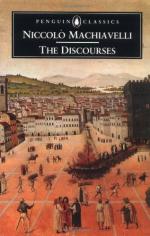
|
| Name: _________________________ | Period: ___________________ |
This test consists of 15 multiple choice questions and 5 short answer questions.
Multiple Choice Questions
1. What often happens to Captains who see a tactical error committed by their enemies?
(a) They are overly cautious and bring defeat.
(b) They move into passes and ambush the enemy.
(c) They take the steps to assure victory.
(d) They are blinded by the desire for victory.
2. What does Machiavelli claim comes to those Republics that are changed through the general public?
(a) The public will appoint inept leaders and it will fall.
(b) The Republic will break apart and be at war with its separate pieces.
(c) New elections will be controlled by the general public.
(d) Only the head of the Republic will be harmed.
3. What were the results for the two Roman Consuls in Machiavelli's illustration?
(a) Fabius destroyed the enemy's city, and Junius was defeated by too many infantrymen.
(b) Claudius' enemy was fooled, and Brutus was discovered.
(c) Decius' soldiers became weary from the first shocks and fled, Fabius' soldiers saved their fury for the end when the enemy lost its energy.
(d) Decius caught his enemy unaware, and Octavius was defeated by artillery.
4. What has Machiavelli considered many times to be the causes of good and bad fortunes to men?
(a) Their manner of proceeding with the times.
(b) Decisions for military tactics.
(c) Their choice of friends.
(d) Enemies knowing their plans.
5. Who does Machiavelli consider to have an advantage in battle?
(a) The Artillery.
(b) The Cavalry.
(c) The largest army.
(d) The attacker.
6. What does Machiavelli consider to be necessary when restoring a Republic from a Tyranny?
(a) Memorable executions against the enemies of the Republic.
(b) Public works projects that help provide citizens with provisions.
(c) Colonies.
(d) Free, fair elections.
7. What does Machiavelli consider necessary to take control over a Republic to install a bad form of government over it?
(a) Bad administrators.
(b) Leaders who are irresolute in their decisions.
(c) Bad Captains.
(d) People corrupted by the times.
8. What does Machiavelli praise of the ancient Roman battlefield tactics?
(a) The fierceness of the soldiers to dictate the terms of every battle.
(b) The ability of the first division to puncture enemy lines so the second and third divisions can over run the command centers.
(c) The ability of the three divisions to outman enemies and scare them from the battlefields.
(d) The ability of the second and third divisions to absorb fallen lines ahead of them and proceed in battle.
9. Why would corrupt Republics accept common deceptions?
(a) Because they keep anyone from knowing any truth.
(b) Because they help to confuse Citizens to the corruption.
(c) Because they are put forward by men who want favors more readily for themselves than for the public.
(d) Because they hide the corruption of the political class.
10. What were placed to the right and the left of every battle line of the Roman army?
(a) The cavalry.
(b) Plebs.
(c) Tribunes.
(d) Captains.
11. What institution does Machiavelli cite in Chapter 46 as being responsible for producing men that are either "harsh or effeminate."
(a) The family.
(b) The Plebs.
(c) The Senate.
(d) The Magistrates.
12. According to Machiavelli, why did Livius believe the Roman Republic grew?
(a) Because of the strength of its soldiers.
(b) Because of the virtue of its Captains.
(c) Because of the wisdom of its Magistrates.
(d) Because of the money of its Nobles.
13. Why does Machiavelli claim that Princes should not complain of faults of People under their authority?
(a) Because the People will become indignant of the criticism.
(b) Because the insults will encourage conspiracy.
(c) Because doing so will blind the Prince to conspiracy.
(d) Because such faults result either from their negligence or because they are stained by similar faults.
14. What finally forced Phillip into battle with Fabius, according to Machiavelli?
(a) He was laid siege in his fort.
(b) The Samnites fell victim to the Trojans.
(c) He was chased to his home and had to put a call out to his soldiers.
(d) The prolonged war worsened his condition and that of his subjects.
15. What does Machiavelli claim to be the cause of Princes losing inherited power?
(a) Indifference to their Principality.
(b) Arrogance.
(c) Incompetence.
(d) Their rejection of laws and ancient institutions.
Short Answer Questions
1. How do weak men handle changes in fortune, according to Machiavelli?
2. What does Machiavelli identify as the difference between a Republic and the State (government) in how they can handle maladies?
3. Of what is Machiavelli critical regarding the military tactics of his day?
4. What does Machiavelli advise Princes in observing promises made under force?
5. In the comparison between the tactics of Scipio and Hannibal, what does Machiavelli consider to be praiseworthy?
|
This section contains 908 words (approx. 4 pages at 300 words per page) |

|




